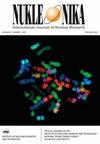Research on dose correction method of vehicle-borne environmental radiation measurement equipment
IF 0.3
4区 物理与天体物理
Q4 CHEMISTRY, INORGANIC & NUCLEAR
引用次数: 1
Abstract
Abstract This study establishes a near-ground reference radiation field based on typical radionuclides of the Fukushima accident in response to the need for vehicle-borne environmental radiation measurement equipment that can accurately evaluate the environmental dose of nuclear accidents. The Monte Carlo code FLUKA is used to study the environmental dose of such equipment in the early and mid-late reference radiation fields of nuclear accidents. Results of the air dose rate at 1 m above the ground were corrected to eliminate data difference between diverse measurement platforms. Simulation results show that t he dose correction factor (CF) fluctuates at approximately 0.8813 in the early reference radiation field and at approximately 0.6711 in the mid-late reference radiation field. This deviation of the dose CF in the early and mid-late reference radiation fields is within 2% and is not affected by the change in detector position. This research can be applied to obtain more accurate measurement of an ambient dose in the near-ground radiation field and support the vehicle-borne environmental radiation measurement technology.车载环境辐射测量设备剂量校正方法研究
摘要针对能够准确评价核事故环境剂量的车载环境辐射测量设备的需求,以福岛事故典型放射性核素为基础,建立了近地参考辐射场。采用蒙特卡罗程序FLUKA对核事故早期和中后期参考辐射场中此类设备的环境剂量进行了研究。为了消除不同测量平台之间的数据差异,对距离地面1 m处的空气剂量率结果进行了校正。模拟结果表明,剂量校正因子(CF)在参考辐射场早期波动约为0.8813,在参考辐射场中后期波动约为0.6711。在参考辐射场的早期和中后期,剂量CF的偏差在2%以内,不受探测器位置变化的影响。本研究可用于近地辐射领域中更精确的环境剂量测量,为车载环境辐射测量技术提供支持。
本文章由计算机程序翻译,如有差异,请以英文原文为准。
求助全文
约1分钟内获得全文
求助全文
来源期刊

Nukleonika
物理-无机化学与核化学
CiteScore
2.00
自引率
0.00%
发文量
5
审稿时长
4-8 weeks
期刊介绍:
"Nukleonika" is an international peer-reviewed, scientific journal publishing original top quality papers on fundamental, experimental, applied and theoretical aspects of nuclear sciences.
The fields of research include:
radiochemistry, radiation measurements, application of radionuclides in various branches of science and technology, chemistry of f-block elements, radiation chemistry, radiation physics, activation analysis, nuclear medicine, radiobiology, radiation safety, nuclear industrial electronics, environmental protection, radioactive wastes, nuclear technologies in material and process engineering, radioisotope diagnostic methods of engineering objects, nuclear physics, nuclear reactors and nuclear power, reactor physics, nuclear safety, fuel cycle, reactor calculations, nuclear chemical engineering, nuclear fusion, plasma physics etc.
 求助内容:
求助内容: 应助结果提醒方式:
应助结果提醒方式:


